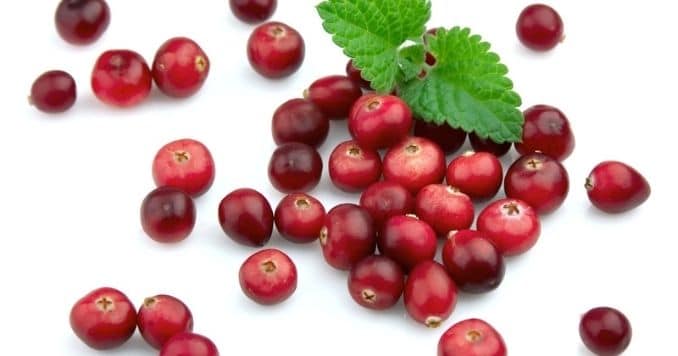I'm sure you've been told that cranberry juice is healthy for you. It can help reduce your risk of urinary tract infections (UTIs), protect heart health, and even keep your teeth plaque-free. In this article, we examine the real scientific evidence behind the humble cranberry and how it may benefit your health.
What Are Cranberries?
Cranberries are a group of evergreen dwarf shrubs or trailing vines that are cultivated throughout the United States, Canada, and Chile. They have slender, wiry stems, and small evergreen leaves with dark pink flowers.
The fruit is a berry that is initially light green, later turning red when ripe. You can eat it straight off the vine, but it has an acidic taste that is often more palatable when sweetened.
Cranberries are typically harvested in the fall between September and November. The vine beds are flooded with water, and then a harvester is driven through to remove the fruit from the vines. The berries are then cleaned, sorted, and stored before being used to make all sorts of products, including cranberry juice, jam, jelly, sauce, and even supplements.
 How Nutritious Are Cranberries?
How Nutritious Are Cranberries?
Cranberries are a water-rich food, consisting of about 87 percent water and 12 percent carbohydrates, with negligible amounts of protein and fat. A half-cup serving of the berries provides about:
- 46 calories
- 4 grams of sugar
- 6 grams of fiber
The same serving also provides the following vitamins and minerals:
- 16 percent of the daily value of vitamin C
- 17 percent of the daily value of manganese
- 8 percent of the daily value of vitamin E
- Small amounts of pantothenic acid (B5), vitamin K, and vitamin B6
It’s important to keep in mind, however, that many of today’s popular cranberry products are full of sugar that tends to cancel out any health benefits of the berries. When shopping for your cranberry products, look for those that are unsweetened or only lightly sweetened.
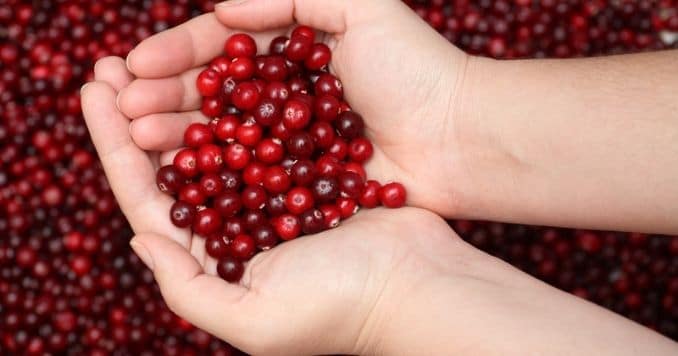 What are the Real Health Benefits of Cranberries?
What are the Real Health Benefits of Cranberries?
1. Cranberries May Help Reduce Recurrent UTIs
It used to be that if you suffered from recurrent UTIs—urinary infections that cause burning, pain, and frequent urges to urinate—you were told to drink a glass of cranberry juice every day to stop them. The cranberries, it was believed, would help prevent the bacteria from sticking to the wall of the bladder and urethra, allowing it to be flushed through and preventing infection.
Some studies have supported this theory, while others haven’t. A comprehensive review in 2012 concluded that there was no evidence that cranberry juice or cranberry tablets or capsules were effective in preventing UTIs.
Some of the small studies in the review showed a small benefit of cranberry juice, but there were no statistically significant differences when the results of a much larger study were included. The researchers suggested that “cranberry juice cannot currently be recommended for the prevention of UTIs.”
Later reviews have shown conflicting results, however. A 2017 review found that cranberry products reduced the incidence of UTIs in women with recurrent infections. Another review of small clinical studies also suggested that consuming cranberry products might reduce the risk of UTIs by 26 percent in otherwise healthy women.
If you want to try cranberry juice for UTIs, it probably won’t hurt you and may help you reduce the number of UTIs you suffer per year.
 2. Cranberries Are Great Sources of Healthy Antioxidants
2. Cranberries Are Great Sources of Healthy Antioxidants
Raw cranberries contain healthy polyphenols which act as antioxidants in the body. These include proanthocyanidins, flavonols, and quercetin. These compounds have been studied for their possible effects on heart health, the immune system, anti-aging, and cancer prevention.
So far, we’re not sure if consuming cranberries helps protect against cancer or aging, though. Part of the problem is that the antioxidants in the fruit are poorly absorbed and excreted rapidly, so they don’t stick around very long.
Many of these healthy antioxidants are also concentrated in the skin of the berry, which is typically removed in most cranberry products you can buy off the shelves—juice, sauce, and jams and jellies. A 2011 study, however, did find that cranberry juice increased the antioxidants in the bloodstream of women after they drank it.
To enjoy the health benefits of the antioxidants in cranberries, your best option is to consume the berries whole. Try mixing them into your favorite fruit smoothie, add them to a morning bowl of oatmeal, or mix them with some olive oil and sugar and add them to your roast pork, turkey, or chicken.
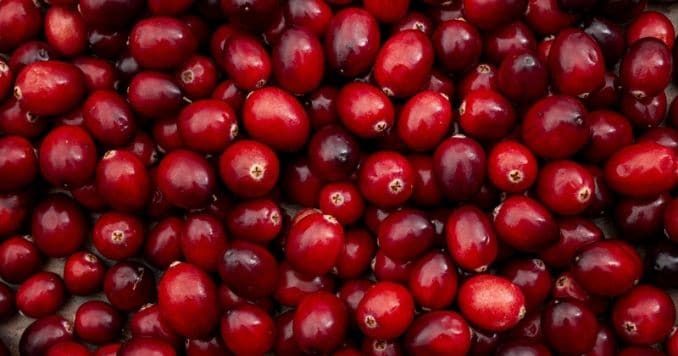 3. Cranberries Can Be Part of a Heart-Healthy Diet
3. Cranberries Can Be Part of a Heart-Healthy Diet
Though cranberries won’t prevent heart disease on their own, they can be a good part of a heart-healthy diet. There is some preliminary evidence suggesting that cranberries may have the ability to increase HDL “good” cholesterol and reduce arterial stiffness, both of which can benefit cardiovascular health.
In a 2006 study, for instance, researchers gave obese men a daily dose of a low-calorie cranberry juice cocktail. The men drank the juice every day for four weeks. At the end of the study period, researchers noted a significant increase in HDL levels. They theorized that this improvement was due to the antioxidants in the cocktail.
An earlier 2003 study found similar results, with scientists finding that 2-3 servings of cranberry juice helped elevate antioxidant levels in the blood, and also encouraged higher levels of HDL cholesterol. “This study gives consumers another reason to consider drinking cranberry juice,” said lead study author Joe Vinson, Ph.D., “which has more health benefits than previously believed. People should consider drinking it with their meals, perhaps as an alternative to soda.”
In a later 2011 study, researchers had subjects with coronary heart disease consume a preparation of double-strength cranberry juice (with extra antioxidants) or a placebo for four weeks each with a two-week rest period in between. They found that aortic stiffness decreased after the men consumed the cranberry juice, in contrast to after the placebo.
Some studies have also indicated that cranberry may help reduce blood pressure, which would also be good for heart health. In a large review of 45 controlled trials, researchers examined the effects of various juices on blood pressure, including barberry, cranberry, grape, pomegranate, blueberry, raspberry, and strawberry. They found that they all significantly reduced blood pressure levels, but after further analysis, concluded that only cranberry and cherry juice might contribute to an improvement in blood pressure.
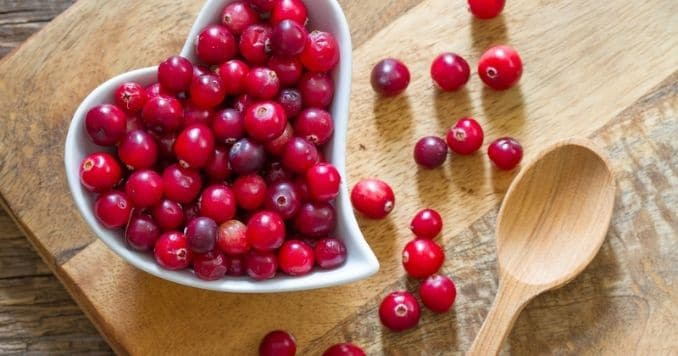 4. Cranberry May Help You Avoid Gum Disease
4. Cranberry May Help You Avoid Gum Disease
Gum disease isn’t just bad for your teeth. Studies have shown that it can be very bad for your heart health, as well. The bacteria that inflame your gums when you have gum disease can travel through the bloodstream into the heart and other organs, causing damage.
In a 2020 consensus report published in the Journal of Clinical Periodontology, researchers found significant evidence to support the associations between gum disease and several other diseases, in particular cardiovascular disease.
It’s more important than ever, therefore, to make sure to keep your teeth and gums healthy. The cranberry may be able to help you do that. The theory is similar to how the berry may act in the bladder—in the mouth, it may also help prevent bacteria from sticking to the surface of the tooth.
According to research published in the British Dental Journal, “the same traits that make cranberry juice a powerful weapon against bladder infections also hold promise for protecting teeth against cavities.” The scientists discovered that the juice made it hard for the bacteria Streptococcus mutans to cling to tooth surfaces.
“Scientists believe that one of the main ways cranberries prevent urinary tract infections is by inhibiting the adherence of pathogens on the surface of the bladder,” the researchers wrote. “Perhaps the same is true in the mouth, where bacteria use adhesion molecules to hold onto teeth.”
The study also showed that cranberry juice disrupted the formation of glucan, which is a building block of plaque. The researchers warned, however, that most cranberry juice brands are high in sugar, which of course is bad for your teeth. (Bacteria thrive on it!) Instead, researchers mentioned possibly adding cranberry anti-cavity compounds into toothpaste or mouth rinses.
Indeed, you can find a toothpaste that includes cranberry on the market today! Just check the ingredient list.
 5. Cranberry May Help Ease Stomach Ulcers
5. Cranberry May Help Ease Stomach Ulcers
Most stomach ulcers are caused by H. pylori bacteria. These little bugs attach to the stomach lining and weaken it, allowing stomach acid to get through to the sensitive lining underneath. Over time, both the acid and the bacteria irritate the lining, causing a sore or ulcer.
In the same way, that cranberry may ward off bacteria in the bladder and mouth, researchers think that it may do the same in the stomach. In a 2005 clinical trial, scientists divided about 190 adults with H. pylori ulcers/infections into two groups. The first group consumed two juice boxes of cranberry juice a day while the second group consumed a placebo drink.
After 90 days, the researchers found that 14 of the 97 subjects in the cranberry juice treatment group no longer showed signs of an H. pylori infection, while only 5 of the 92 in the placebo no longer showed signs. These are modest results, but they do show that cranberry juice may be helpful in some cases.
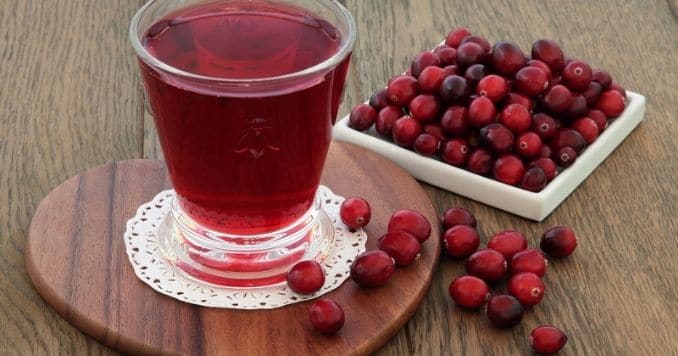 Healthiest Source of Cranberries
Healthiest Source of Cranberries
Though most people can enjoy cranberry products in moderation, excessive consumption can cause stomach upset and diarrhea, and may also increase the risk of kidney stones in those who are vulnerable to them.
To get the highest levels of beneficial nutrients from cranberries, choosing fresh berries is best. You can also make your own juice at home and thereby prevent the high levels of added sugars that you’ll find in most store-bought options.
Besides fresh, organic berries and juices are usually the healthiest options. These tend to be low in added sugars, plus they’re typically processed in a healthier way (with fewer chemicals) than are conventional juices and sauces.
Though it’s typically best to get your health benefits from food, if you’re considering cranberry supplements, look for quality brands that you can trust. The supplement is generally considered safe and doesn’t have significant drug interactions. The dosage varies depending on the preparation, but 300-400 mg per day of a cranberry extract supplement is typical.
Learn the 10 best daily habits for a strong and healthy back. Click here for more info.

